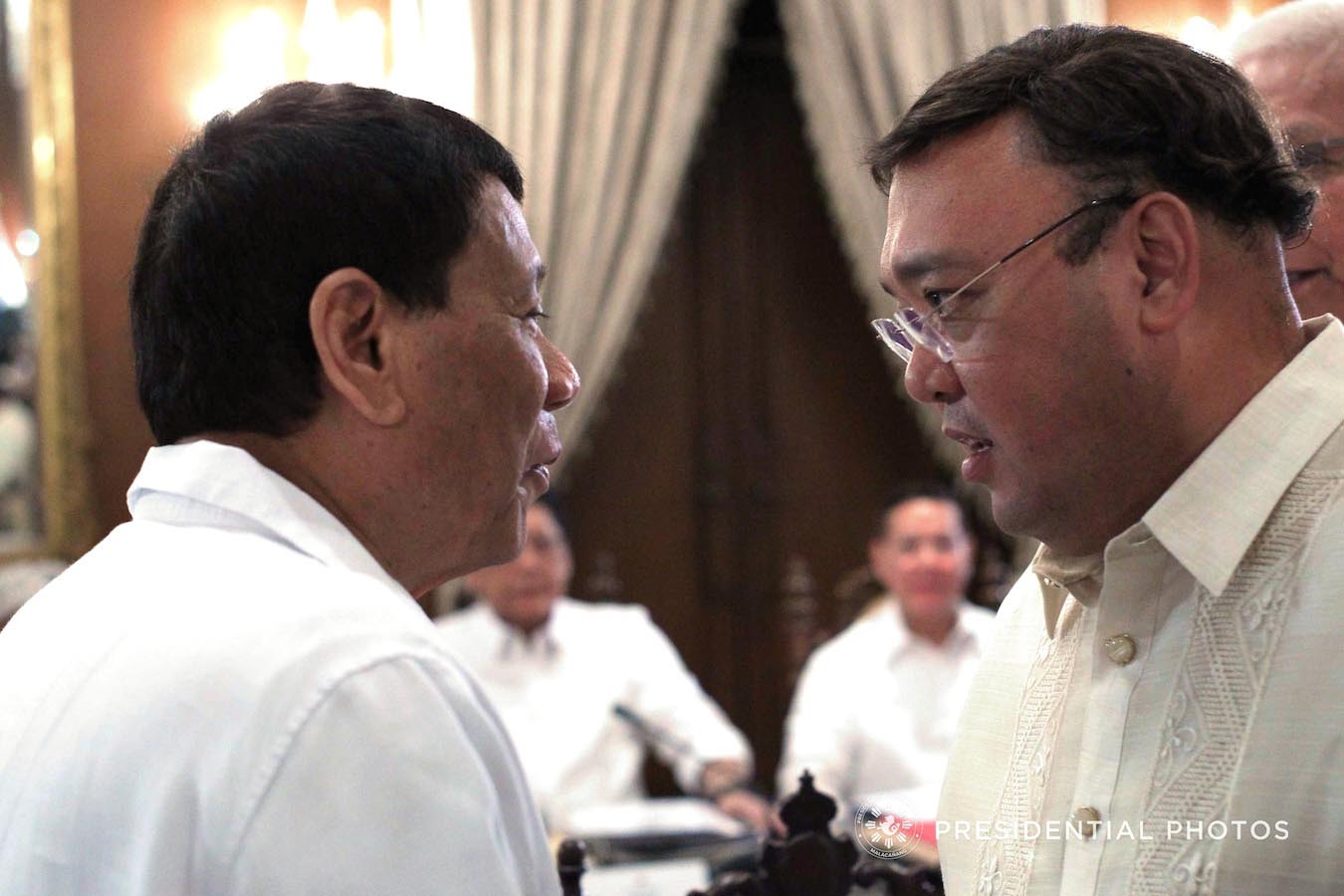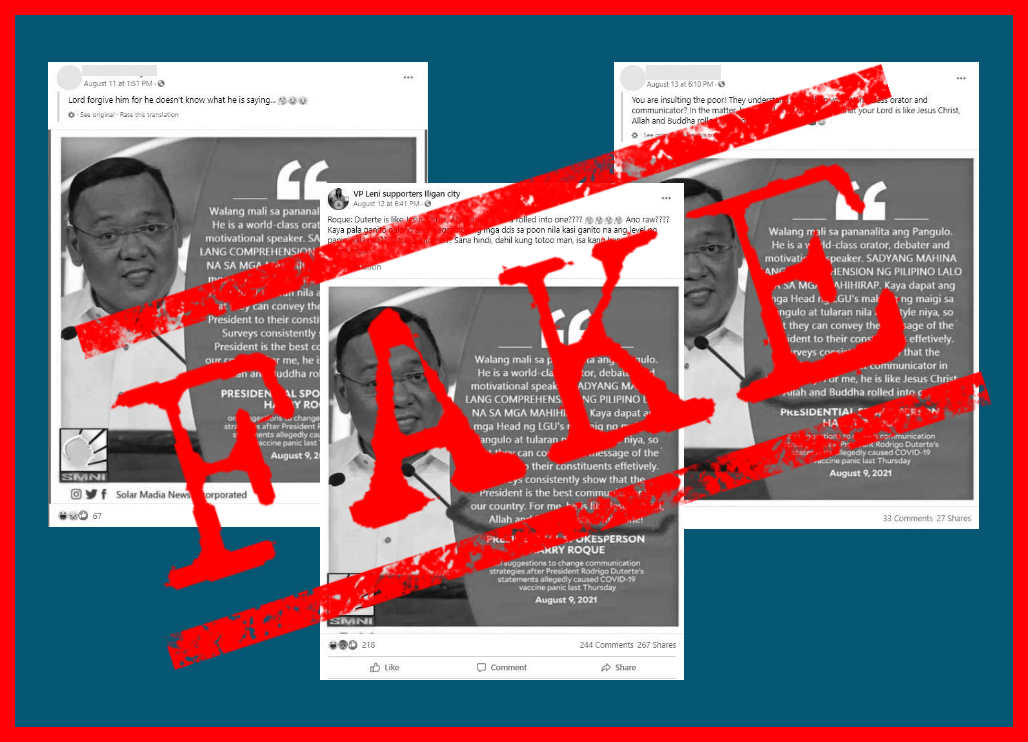In trying to distance President Rodrigo Duterte from the much criticized anti-terrorism bill, Palace Spokesperson Harry Roque wrongly claimed the measure had gotten the nod of the Senate as early as in the 17th Congress.
Roque’s claim that the bill “did not come from the president” himself also needs context.
Watch the video:
Created in 1992, LEDAC serves as a “consultative and advisory body to the president” on programs and policies that are “essential to the realization of the goals of the national economy.” Composed of 20 members, it consists of a mix of executive and legislative officials, including the Senate president and House speaker, and is chaired by the president himself.
The council has yet to approve its “common legislative agenda” for the 18th Congress, according to a performance indicator released in December 2019.
Interviewed during the opening of the 18th Congress in July 2019, Sotto said the proposed “Anti-Terrorism Act,” will be among the Senate’s priority bills since it was “left behind” from the previous Congress for “lack of time.”
Bills that were not successfully enacted by the end of a congressional term will have to be refiled and undergo the same process in the next term.
The proposed Anti-Terrorism Act regained traction in the current Congress when several measures amending the HSA were refiled in the Senate. These were later consolidated and passed on final reading on Feb. 26.
The House followed suit on June 4, adopting the Senate version of the measure, after Duterte certified it as urgent on June 1. (See The Anti-Terrorism Act 2020: Foreign Borrowings and Local Hacks)
The bill now awaits the president’s signature. He may, however, still opt to veto it or simply let it lapse into law come July 9, 30 days after it was received by Malacanang.
If enacted, the Anti-Terrorism Act of 2020 will expand the definition of terrorist acts to planning, inciting, training, preparing, and facilitating any acts by speeches, proclamations, writings “for the purpose of intimidating” the public and creating an “atmosphere of fear.” It will also extend the period of warrantless detention for suspected terrorists from a maximum of three days to as long as 24 days. (See VERA FILES FACT SHEET: What you need to know about the Senate’s anti-terrorism bill)
Sources
Presidential Communications Operations Office, Interview with Presidential Spokesperson Harry Roque by Rowena Salvacion — DZBB, June 13, 2020
Office of the Presidential Spokesperson Facebook, Presidential Spokesperson Harry Roque DZBB Media Interview, June 13, 2020
Presidential Communications Operations Office, Interview with Presidential Spokesperson Harry Roque by Karen Davila – Headstart/ANC, June 17, 2020
Senate of the Philippines, Senate Bill No. 2204: Anti-Terrorism Act of 2019, Feb.4, 2019
Senate of the Philippines, Overview of Senate Bill No. 2204: Anti-Terrorism Act of 2019, Feb. 4, 2019
Commission on Appointments, Calendar of Sessions: Third Regular Session for 17th Congress of the Philippines, Aug. 14, 2018
House of Representatives in the Philippines, House Bill No. 7141:Prevention of Terrorism Act of 2018, Feb. 7, 2018
House of Representatives in the Philippines, House Bill No. 5507: Unlawful Membership in Terrorist Organizations Act of 2017, May 2, 2017
Senate of the Philippines, Transcript of Interview of Senate President Vicente C. Sotto III, July 22, 2019
Official Gazette of the Philippines, Republic Act No. 9372: Human Security Act of 2007, March 6, 2007
Presidential Legislative Liaison Office, 17th Congress Priority Legislative Measures: Common Legislative Agenda and President’s Legislative Agenda
Official Gazette of the Philippines, Republic Act No. 7640: Legislative-Executive Development Advisory Council, Dec. 9, 1992
Legislative Executive Development Advisory Council, The LEDAC in Brief
Legislative Executive Development Advisory Council, Performance Indicator, Dec. 31, 2019
Senate of the Philippines, Senate Bill No. 1083: The Law on the Prevention of Terrorist Acts of 2020, Sept. 30, 2019
National Economic and Development Authority, Legislative Executive Development Advisory Council (LEDAC)
Senate of the Philippines, Senate Bill No. 1083: The Law on the Prevention of Terrorist Acts of 2020, Sept. 30, 2019
House of Representatives in the Philippines, House Bill No. 6875: The Anti-Terrorism Act of 2020, June 4, 2020
Senate of the Philippines, Legislative Process: Final Legislative Action
Rappler, Congress transmits anti-terrorism bill to Malacañang, June 9, 2020
CNN Philippines, Malacañang receives anti-terrorism bill for Duterte’s signature, June 9, 2020
ABS-CBN News, Congress transmits Anti-Terror bill to Palace for Duterte’s signature, June 9, 2020
Presidential Communications Operations Office, 2016 State of the Nation Address by President Rodrigo Roa Duterte, July 25, 2016
(Guided by the code of principles of the International Fact-Checking Network at Poynter, VERA Files tracks the false claims, flip-flops, misleading statements of public officials and figures, and debunks them with factual evidence. Find out more about this initiative and our methodology.)




